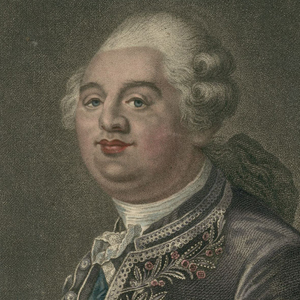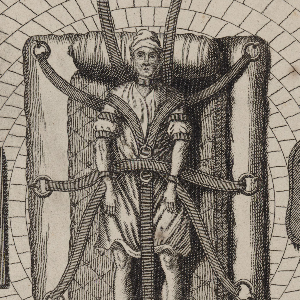Europe

Source Collection: Monarchy Embattled
Reality never matched the popular image of the all-powerful French King. Even Louis XIV, exalted by his own propagandists and many historians as the Sun King, never actually enjoyed that kind of authority. Theories of divine right, which linked the King to God, proved untenable for many.

Louis XVI distributes aid to the Poor
Here Louis XVI is portrayed as a benevolent king distributing alms to the poor, an appropriate action for the "Father of his people." However, his rich fur–clad outfit contrasts with the abject poverty of the common people, suggesting to those inclined to be critical that the King did not underst

Louis the Sixteenth, King of France and of Navarre
This portrait demonstrates Louis at the height of his power and authority on the eve of the French Revolution.

Removal of the Parlements
The French Revolutionary engraving's depiction of the physical eviction of the black–robed magistrates in front of a female audience has a somewhat ambiguous message.

Damiens Being Broken on the Wheel
This straightforward representation of Damiens gives no hint of sympathy for a would–be pre-revolutionary royal assassin.
The Coronation of Louis XVI from the Gazette of France (1775)
These two articles from the official newspaper of the day describe the coronation of Louis XVI at Reims, the city to which French kings had traveled to be anointed and crowned for a thousand years.
Moreau, "On the Origins of the French Monarchy"
Jacob–Nicolas Moreau wrote this excerpt as part of his Lessons of Morality, Politics and Law (1773) at the request of the aging Louis XV for the instruction of the Dauphin. Throughout the 200–page book, Moreau defends the power of the King to rule France without opposition.
Bossuet, "The Nature and Properties of Royal Authority"
Jacques–Benigne Bossuet (1627—1704), bishop of Meaux, was a well–known seventeenth–century peacher who believed that although France had a sizable minority of Protestants, France should have a single religion, Catholicism.
Proclamation of the Department of the Seine–et–Oise (9 March 1792)
Despite the radical measures taken by the National Assembly, such as the abolition of nobility and the Civil Constitution of the Clergy, social conflicts continued to manifest themselves after the National Assembly completed its work in 1791.
Letter from Rabaut de Saint–Étienne to the Minister of the Interior (27 February 1791)
In this document, Jean–Paul Rabaut de Saint–Étienne, a Protestant pastor from Nîmes who had been a deputy to the National Assembly and who would later be elected to the National Convention, warns the central government of the ongoing violence in the Midi and the role of refractory priests and rel